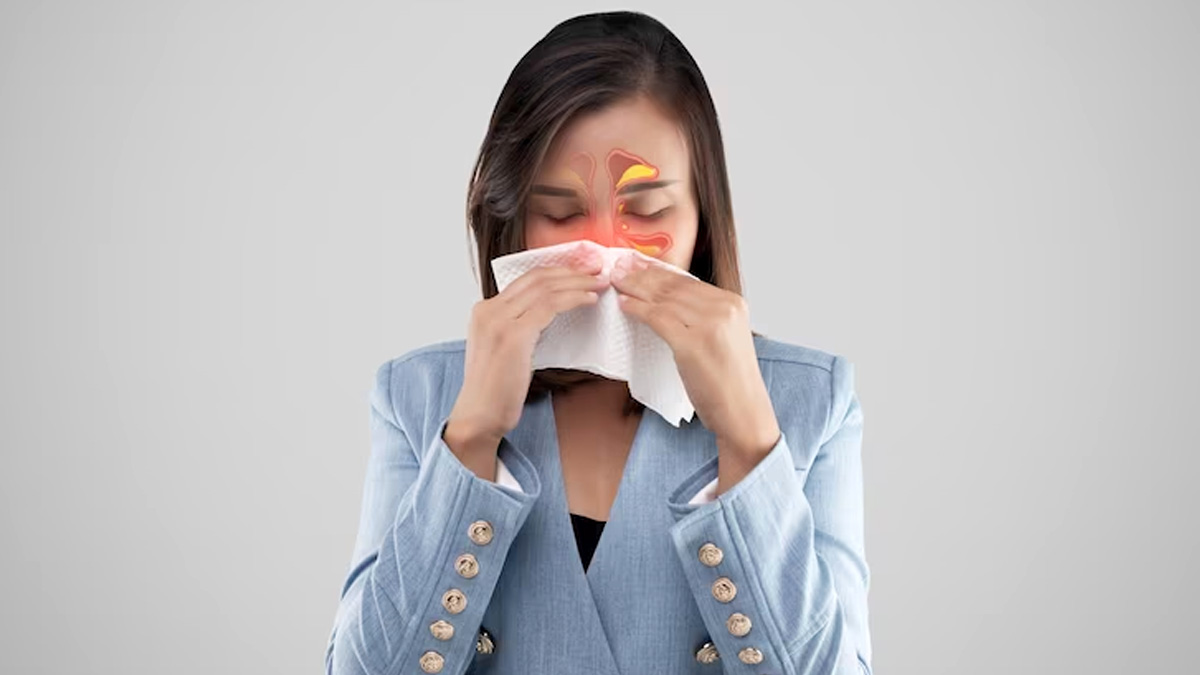
Millions of individuals throughout the world suffer from sinusitis, which is a common ailment. Sinuses, small air-filled cavities located within the bones of the face and skull, could occur when they become inflamed or infected. Numerous conditions, such as bacterial or viral infections, allergies, and structural issues with the nasal passages, can result in sinusitis. When the lining of the sinuses becomes inflamed, it can block the flow of mucus and cause a pressure buildup, leading to pain and congestion.
Table of Content:-
Sinusitis can occur in both summer and winter. On hot days with dry air, the mucus in your nose may thicken and cling together, clogging the sinuses and causing stuffiness and headaches. Changes in barometric pressure, such as when a summer rainstorm hits in the afternoon, can cause sinus irritation and headaches. Dr Rajasekar M K, Ear, Nose, and Throat (ENT) Specialist, Head & Neck Surgeon, Apollo Spectra Hospital, Chennai, provides tips to manage sinusitis in summer.
Symptoms of Sinusitis
The symptoms of sinusitis change depending on the severity of the illness. Some common symptoms include:
Nasal Congestion: One of the most common symptoms of sinusitis is nasal congestion, which can make it difficult to breathe through the nose. This congestion can also lead to a buildup of mucus, which can cause post nasal drip and cough.
Headache: Headache is another common symptom of sinusitis, particularly when inflammation or infection affects the frontal sinuses. This type of headache is often described as a dull, throbbing pain that is felt in the forehead or around the eyes.

Also Read: Fungal Sinusitis: Symptoms, Preventative Measures & More
Facial pain or pressure: Facial pain or pressure is also common in sinusitis. This pain is usually felt in the cheeks, nose, or forehead and can be accompanied by tenderness or swelling. The pressure can also cause discomfort in the ears and teeth, leading to ear pain and toothaches.
Loss of olfactory senses: Loss of sense of smell or taste is another possible symptom of sinusitis. This can occur when inflammation or congestion blocks the olfactory nerve, which is responsible for detecting smells. It can also affect the taste buds, leading to a decreased ability to taste flavours.
Sore throat and fatigue: Coughing and a sore throat can also be symptoms of sinusitis. This is often due to postnasal drip, which can irritate the throat and cause a cough. Fatigue is also common in sinusitis, as the body works to fight off the infection and inflammation.

Bad breath: Bad breath is another possible symptom of sinusitis. This is often due to the buildup of mucus in the sinuses, which can provide a breeding ground for bacteria. As a result, a foul odour may be present in the breath.
Fever: Fever may occur in cases of acute sinusitis. This is the body's natural response to infection, as it tries to fight off the invading bacteria or virus. However, not all cases of sinusitis will result in a fever.
In some cases, sinusitis can also cause tooth pain, ear pain, or increased pressure in the eyes.
Treatment of Sinusitis in Summer
The underlying reason and the degree of the symptoms will determine the best course of treatment for sinusitis. In many cases, the condition will resolve on its own without medical intervention. However, if symptoms persist or are severe, treatment may be necessary.

Some common treatment options to treat sinusitis in summer include:
- Antibiotics: If the sinusitis is caused by a bacterial infection, antibiotics may be prescribed to help clear the infection.
- Decongestants: Over-the-counter decongestants can help reduce nasal congestion and relieve pressure in the sinuses.
- Nasal corticosteroids: These medications can help reduce inflammation in the nasal passages and sinuses.
- Saline nasal irrigation: This involves rinsing the nasal passages with a saltwater solution to help remove mucus and reduce inflammation.
In some cases, surgery could be necessary to treat sinusitis. This may include procedures to remove blockages or correct structural abnormalities in the nasal passages.
Also Read: Common Cold Vs Acute Sinusitis: Know The Difference Between Them From An Expert
Prevention of Sinusitis in Summer
To reduce the risk of developing sinusitis in summer or any other season, it is important to practise good hygiene and avoid exposure to allergens or irritants that can trigger symptoms. This may include:
- Wash hands regularly.
- Avoiding cigarette smoke and other air pollutants.
- It is recommended to use a humidifier to maintain moisture in the air.
- Avoiding allergens, such as dust and pollen.
- Drinking plenty of fluids helps thin mucus and promote drainage.
Bottomline
Sinusitis is a common condition that can cause a range of symptoms, from nasal congestion to facial pain and pressure. Treatment options may vary depending on the underlying cause and severity of the condition but may include antibiotics, decongestants, nasal corticosteroids, and saline nasal irrigation. By practising good hygiene and avoiding allergens and irritants, one can help reduce the risk of developing sinusitis in the summer.
Image Credits: freepik
Also watch this video
How we keep this article up to date:
We work with experts and keep a close eye on the latest in health and wellness. Whenever there is a new research or helpful information, we update our articles with accurate and useful advice.
Current Version